Coming out of the COVID-19 pandemic, 2023 has been a year notable for its ups and downs on the higher education landscape with the elimination of affirmative action and the implosion of President Joe Biden’s student relief program.
At the same time, scholars are working around the clock to stave off ongoing anti-DEI legislation that has already taken hold in states like Florida and Texas, where many politicians campaigned against diversity, equity, and inclusion (DEI) programs.
Affirmative action struck down
The U.S. Supreme Court dismantled decades of legal precedent in June, ruling against race-conscious college admissions and bringing an end to affirmative action practices in higher education.
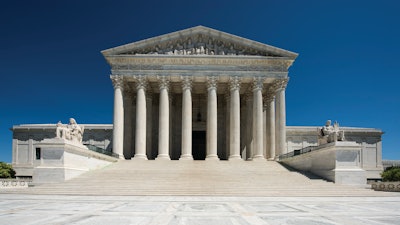 The U.S. Supreme Court dismantled decades of legal precedent in June, ruling against race-conscious college admissions and bringing an end to affirmative action practices in higher education.
The U.S. Supreme Court dismantled decades of legal precedent in June, ruling against race-conscious college admissions and bringing an end to affirmative action practices in higher education.
The high court voted 6-3 against UNC and 6-2 against Harvard. Justice Ketanji Brown Jackson recused herself from the latter case because she served on the Harvard Board of Overseers.
“[Universities] have concluded, wrongly, that the touchstone of an individual’s identity is not challenges bested, skills built, or lessons learned, but the color of their skin,” Chief Justice John Roberts wrote in a majority opinion. “Our constitutional history does not tolerate that choice.”
The ruling still allows for race to be included in college applications, so long as discussion of race is concretely tied to an applicant’s character or unique ability.
“Nothing in this opinion should be construed as prohibiting universities from considering an applicant’s discussion of how race affected his or her life, be it through discrimination, inspiration, or otherwise,” Roberts wrote. “A benefit to a student who overcame racial discrimination, for example, must be tied to that student’s unique ability to contribute to the university. In other words, the student must be treated based on his or her experiences as an individual — not on the basis of race.”
This leaves the door open for alternatives such as considerations of socioeconomic status in admissions, though research has indicated that cutting affirmative action in admissions leads to declines in underrepresented minorities at colleges.
In response to the decision, the U.S. Department of Education (ED) issued guidance for how schools can navigate admissions and still consider other factors in evaluating applicants, including neighborhood and high school data, life challenges, and experiences of racial discrimination. Additionally, schools were told that they can still implement outreach, recruitment, and pathway programs that are race conscious. Another door the court left open was the legal carve-out for military academies employing similar practices.
“No military academy is a party to these cases, however, and none of the courts below addressed the propriety of race-based admissions systems in that context,” Roberts wrote. “The opinion also does not address the issue, in light of the potentially distinct interests that military academies may present.”
The court’s decision was widely criticized by those advocating for diversity in higher ed who voiced concerns over campus diversity and equity.
Students for Fair Admissions, the conservative organization behind the lawsuits, has since turned its gaze toward military academies, seeking to eliminate race-conscious considerations there as well. The group is currently suing The United States Military Academy West Point.
Student debt relief dashed
The Biden-Harris administration’s plans to forgive thousands of dollars in student loan debt for individuals fell through this year in a partisan 6-3 ruling by the Supreme Court, which deemed the plans unconstitutional.
Per the one-time federal student loan debt relief effort, Pell Grant recipients who earned within a certain amount of income during the pandemic — less than $125,000 for individuals and under $250,000 for married couples or heads of households — would have had up to $20,000 in debt forgiven. Those who did not receive a Pell Grant would have been eligible for up to $10,000 in relief.
On June 30, the Supreme Court struck down the measure, which was based on the Higher Education Relief Opportunities for Students (HEROES) Act of 2003. According to administration officials, the policy gives the Secretary of Education the ability to “waive or modify” federal student aid provisions of the Higher Education Act of 1965 (HEA) in the case of a national emergency such as the pandemic. But the majority on the court disagreed. Chief Justice Roberts wrote in his majority opinion that the administration’s plan was less of a modification and more of an outright upheaval.
“The Secretary’s plan has ‘modified’ the cited provisions only in the same sense that ‘the French Revolution ‘modified’ the status of the French nobility’ — it has abolished them and supplanted them with a new regime entirely,” Roberts wrote.
According to Roberts, mass debt cancellation was under the purview of Congress, not the Secretary of Education.
Dissenting, Associate Justice Elena Kagan argued that Congress had chosen to delegate authority to the Secretary of Education to respond to emergencies, student loan forgiveness program included.
“That authority kicks in only under exceptional conditions,” Kagan wrote. “But when it kicks in, the Secretary can take exceptional measures.”
Student debt relief pursuits continue
After suffering the Supreme Court’s rejection on its student debt forgiveness plan, the Biden-Harris administration sought other routes to provide borrowers some relief.
One of the alternatives came in the form of the Saving on a Valuable Education (SAVE) repayment plan, an income-driven repayment (IDR) plan with nearly 5.5 million borrowers enrolled as of Oct. 15.
The plan dictates that single borrowers earning less than $32,800 annually or those in a family of four making less than $67,000 have $0 payments. And as long as monthly payments are made, balances will not grow from unpaid interest.
Approximately 2.9 million borrowers have $0 payments, and 75% of SAVE borrowers are Pell Grant recipients, meaning they are or were low-income college students.
The administration also implemented a 12-month repayment “on-ramp” from Oct. 1, 2023, to Sept. 30, 2024, so that borrowers who did not begin repayment by October did not suffer from late fees or loans going into default, though interest will accrue.
The Biden-Harris administration is also pursuing debt cancellation efforts aimed at adopting new regulations into the HEA. The plan is for ED to discuss and develop debt relief policies with student loan stakeholders through a negotiated rulemaking process. The non-federal negotiators named in September come from 14 different constituencies. Three rulemaking sessions were scheduled for October, November, and December.
“If we reach consensus on a proposal with the non-federal negotiators, our proposed rule generally reflects that consensus. If not, we will propose the regulations we believe to be most appropriate,” U.S. Under Secretary of Education James Kvaal said in September. “The public will have an opportunity at that stage to provide another round of input by commenting on those proposed rules.”
Legal experts predict this approach will face challenges in court.
Harvard’s first Black president
Dr. Claudine Gay broke new ground in July and made history at the nation’s oldest higher ed institution. She became the first Black president to lead Harvard. Gay is only the second woman to lead the university and the second Black woman to lead an Ivy League university.
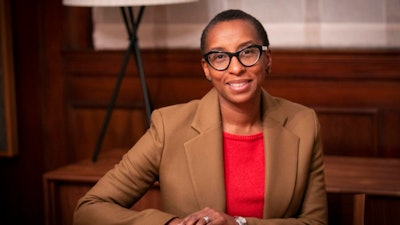 Dr. Claudine GayStephanie Mitchell, Harvard University
Dr. Claudine GayStephanie Mitchell, Harvard University
Gay previously served in several roles at the school, including the Edgerley Family Dean of Harvard’s Faculty of Arts and Sciences, dean of social science, professor of government, and professor of African and African American Studies.
Before joining the faculty at Harvard, Gay — a scholar of race, political behavior, and democracy — spent time teaching as an assistant professor of political science at Stanford University. She holds a B.A. in economics from Stanford and a Ph.D. in government from Harvard.
Attacks on DEI and education
The year, 2023, was another filled with state-level opposition to DEI in education. One of the most notable efforts was Texas’s Senate Bill 17, legislation restricting public higher ed institutions in the state from having a DEI office and requiring staff to take diversity training. SB17, signed by Texas Gov. Greg Abbott, takes effect Jan. 1, 2024. Abbott also signed Senate Bill 18, which requires schools to adopt policies about granting and revoking tenure.
According to free expression organization PEN America, 392 state-level educational intimidation bills were introduced between January 2021 and June 2023 with 39 passing into law. Additionally, 110 new educational gag orders — many targeting sexual orientation and gender identity in K-12 schools — were introduced in 2023, PEN America reported.
Faculty strikes back
Employee dissatisfaction with parts of the job, such as pay and working conditions, was prominent this year. Multiple ranks of employees in higher ed, from faculty to student workers, noted dissatisfaction through unionization and strikes at schools from coast to coast. Schools embroiled in strikes this year included Rutgers University, University of Michigan, Temple University, and the University of Colorado Boulder.
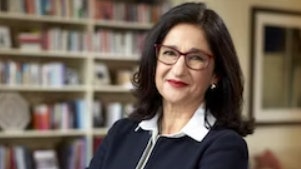 Dr. Nemat “Minouche” Shafik
Dr. Nemat “Minouche” Shafik
“[From] January 2022 to June 2023, we showed that there has been a vast acceleration of unionization by student workers [and], in particular, graduate assistants but also undergraduate student workers,” said William Herbert, executive director of Hunter’s National Center for the Study of Collective Bargaining in Higher Education and the Professions.
Herbert and his co-authors attributed this prominence to several factors including rising public support for organized labor, increased centrality of social justice issues in student-worker organizing, the pandemic’s impact on working conditions and public awareness of labor issues, and support from industrial unions.
Notable appointments
In July, Dr. Nemat “Minouche” Shafik took the helm of Columbia University as the first woman to lead the school. She is the 20th president of the Ivy League titan. The renowned economist and former president of the London School of Economics also took on the position of Professor of International and Public Affairs at Columbia.
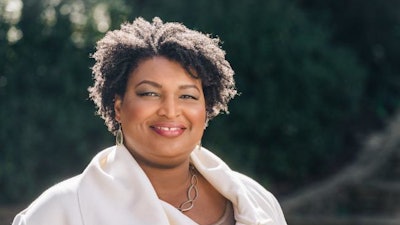 Stacey Abrams
Stacey Abrams
“Stacey Abrams is a respected voice in American politics, known for her advocacy for voting rights, criminal justice reform, environmental justice, and economic empowerment for marginalized communities,” said Dr. Anthony K. Wutoh, Howard provost and chief academic officer in an announcement in April. “She continues to be an influential figure in the Democratic Party and a role model for young women and people of color who aspire to enter the policy arena.”
Abrams has achieved many firsts in her career, including being the first woman to lead either party in the Georgia state legislature, the first African American to lead the Georgia House, and the first African American woman to win a major party nomination for governor as the Democratic nominee in Georgia.
In October, Dr. Melissa L. Gilliam was appointed to the role of president of Boston University. Effective July 1, 2024, she will become the school’s first woman and first Black president. With over a decade of experience in higher education, the physician and scholar has served at schools including The Ohio State University and the University of Chicago.
“[My clinical experience] gives me a lot of insight into the role of health and well-being and how it can really be a barrier to people being able to fully participate at work,” Gilliam told Diverse in October.
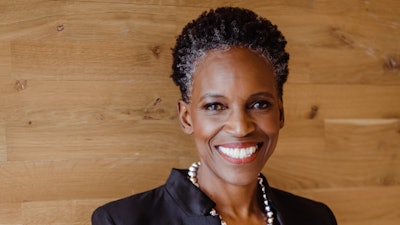 Dr. Melissa Gilliam,
Dr. Melissa Gilliam,
Retirements
Jennie Vaughan, chancellor of Ivy Tech Community College Bloomington, retired in May, after more than 25 years at the school. She had served as chancellor since 2014, helping the school expand its academic offerings and raise nearly $15 million.
Dr. Lester C. Newman, president and CEO of Jarvis Christian University, retired in June, after 11 years of leading Jarvis and 47 years in higher ed. Under his leadership, the school saw improved enrollment and educational programs as well as its transition from a college to a university.
Dr. Katherine Conway-Turner, president of SUNY Buffalo State, retired at the end of the 2022-23 school year, capping off nine years of leading Buffalo State and 43 years in higher ed leadership. During her tenure, she led the school in efforts to upgrade facilities and bolster civic engagement.
Clarence Armbrister, president of Johnson C. Smith University, stepped down in June, retiring as the HBCU’s 14th leader.
Dr. Kent J. Smith, president of Langston University, retired at the end of the 2023 spring semester. As president of Oklahoma’s only HBCU, Smith served 11 years at Langston and 30 years in education under his belt.
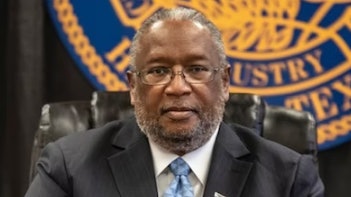 Dr. Lester C. Newman
Dr. Lester C. Newman
In Memoriam
Lauded legal theorist and civil rights advocate Charles J. Ogletree, Jr., died in August at age 70. Throughout his storied career, Ogletree served in several high-profile legal roles, such as deputy director of the District of Columbia Public Defender Service, the Harvard Law School Jesse Climenko Professor of Law, and the founding and executive director of the Charles Hamilton Houston Institute for Race and Justice.
As an attorney, he represented the likes of the late rapper Tupac Shakur and attorney Anita Hill and sought reparations for survivors of the 1921 Tulsa Race Massacre.
“Professor Ogletree was a once-in-a-century kind of law professor,” said Amos Jones, an attorney who served as Ogletree’s research assistant during his time as a student at Harvard Law School. “He managed to practice at the very highest levels on behalf of the most marginalized, while also teaching and serving as a theorist at the very highest levels in the world. Those shoes cannot be filled.”
Former University of North Carolina System President Molly Corbett Broad died Jan. 2, at age 81. She served as system president for nearly a decade (1997-2005) and was the first woman to lead the American Council on Education.
Georgia Clark Sadler, the U.S. Naval Academy’s first female instructor, died Nov. 30, at age 81. The trailblazer was the first female intelligence briefer for the chairman of the Joint Chiefs of Staff in 1975.
Former University of Wisconsin-Madison (UWM) Chancellor Dr. Rebecca Blank died Feb. 17, at age 67. Blank was one of UWM’s longest-serving chancellors. She was also expected to be the first female president of Northwestern University. However, health issues prompted her to resign.
Human rights activist and civil rights lawyer Randall Robinson died March 24, at age 81. His storied career included advocacy against apartheid and for Haitian democracy and reparations for Black Americans. He was one of the leaders of the anti-apartheid Free South Africa Movement and founder and president of the foreign policy advocacy organization, TransAfrica.
Dr. Dana B. Hamel, the founding chancellor of Virginia Community College, died in June at age 99. The U.S. Army Air Corps veteran oversaw Roanoke Technical Institute and led the Virginia Center for Public/Private Initiatives as executive director.
Chicano activist and writer Dr. Roberto ‘Cintli’ Rodriguez died in July at age 69. During his life, he was an ardent advocate for Mexican American Studies classes in Arizona public schools. The Mexican American Studies educator was also a former staff writer for Diverse.
Dr. Theresa A. Powell, Temple University’s vice president for student affairs, died Jan. 2. Powell was known and respected for her work in student affairs.
Temple’s acting president, JoAnne Epps, died in September at age 72. She died following an onstage collapse at the Temple Performing Arts Center during an event honoring the late Charles L. Blockson, curator emeritus of Temple’s Charles L. Blockson Afro-American Collection. A legal scholar, Epps previously served as a Philadelphia assistant U.S. attorney and a Los Angeles deputy city attorney.
Famed basketball coach Bob Knight died in November at age 83. Notorious for his violent outbursts over the years, Knight was nonetheless renowned for his Hall of Fame career with three national titles at Indiana University Bloomington and his 1965 record as the youngest Division I coach at age 24 at the United States Military Academy.
Dr. Orinthia T. Montague, president of Volunteer State Community College, died Sept. 22, at age 56. The veteran higher ed leader was the school’s fourth president, having previously served as president elsewhere at Tompkins Cortland Community College.
Tasha Butts, head coach for the Georgetown University women’s basketball team, died Oct. 23, at age 41. For two years, the former WNBA athlete battled breast cancer and managed to help coach Georgia Tech to an NCAA Tournament berth.
DACA held back again
In September, the Obama administration-era Deferred Action for Childhood Arrivals (DACA) program was again ruled unlawful.
DACA, a program created in 2012 by executive order was meant to provide protections to undocumented immigrants who came stateside as children. It would permit such individuals, also known as Dreamers, to stay in the U.S. and work. As of March 2023, there were nearly 600,000 DACA enrollees.
Federal Judge Andrew Hanen of the Southern District of Texas ruled against the Biden administration’s effort to codify DACA into federal regulation, arguing that the attempt violated the government’s Administrative Procedure Act.
Notwithstanding, Hanen’s ruling will not change the status of current DACA beneficiaries. “To be clear, neither this order nor the accompanying supplemental injunction requires the [Department of Homeland Security] or the Department of Justice to take any immigration, deportation, or criminal action against any DACA recipient, applicant, or any other individual that would otherwise not be taken,” Hanen wrote earlier this year.
Florida vs. DEI
Of the states fighting against DEI and Black studies movements, few have been as prominent as Florida. The state’s opposition to such efforts this year began in January, with Florida Gov. Ron DeSantis’s administration blocking initial plans to pilot College Board’s Advanced Placement (AP) African American Studies in Florida high schools.
The testing company went back to revise the course framework, and reporting indicated that College Board did have repeated contact with Florida officials before the new version was released Feb. 1.
When released, the Feb. 1 African American Studies framework received criticism over removing or downplaying certain subject matter, such as Black Lives Matter, slavery reparations, and queer life. College Board later acknowledged fault in the framework’s rollout and pushed back against Florida’s claims, adding to tensions between the two.
The testing company has not said that the choice to revise was because of Florida’s rejection and has instead argued that those conversations with state officials did not affect decisions.
 In 2023, higher education faced challenges such as the elimination of affirmative action and the implosion of President Joe Biden’s student relief program.
In 2023, higher education faced challenges such as the elimination of affirmative action and the implosion of President Joe Biden’s student relief program.
“After each written or verbal exchange with them, as a matter of professional protocol, we politely thanked them for their feedback and contributions, although they had given none,” the statement continued. “In Florida’s effort to engineer a political win, they have claimed credit for the specific changes we made to the official framework.”
College Board has since announced that it will not acquiesce to Florida’s demands for its AP courses and that it will once again revise the course.
Additionally, DeSantis took aim at the New College of Florida, making efforts to hard-shift the left-leaning school in a more conservative direction. As part of that goal, he appointed six new board members for five-year terms in January, one being conservative activist Christopher Rufo, senior fellow at right-wing think tank The Claremont Institute and known anti-CRT and anti-DEI voice.
“Promises to upend programs with ideologically driven claims that could not be farther from the truth of what actually occurs in a higher education classroom — these do nothing to improve New College, nor will they draw interested students to a campus where trustees are so at odds with the faculty, the local administration, and the truth,” Dr. J. Andrew Gothard, president of the United Faculty of Florida union, said in a January statement.
The trustees proceeded to fire New College President Dr. Patricia Okker, dissolve the school’s office of outreach and inclusive excellence, and fire the dean of diversity, excellence, and inclusion. Students and faculty there have since made their concerns known.
Tensions over Gaza rise on campuses
College campuses, along with the rest of the U.S., have seen tensions escalated in recent months over the ongoing conflict in Gaza, which has claimed the lives of several thousands.
In October, an Hamas attack on a music festival in Israel reignited the longstanding strife between Israel and Palestine, resulting in the former leading a dedicated, multi-faceted assault on the Gaza Strip. According to the Washington Post, more than 11,100 Palestinians have been killed in Gaza since Oct. 7, most are women and children.
These outcomes have prompted several protests on university campuses, including pro-Palestinian student walkouts at Princeton University, New York University, and Columbia University and demonstrations at George Washington University.
“The humanitarian and health crisis in Gaza has reached catastrophic proportions,” Dr. Ahmed Al-Mandhari, the World Health Organization’s regional director for the Eastern Mediterranean, said in October.
The tension has been reflected in a rise in antisemitic incidents across the U.S., according to the Anti-Defamation League, and concerns over free speech on campus.
Rashad leaves Howard deanship
In August, award-winning actress Phylicia Rashad, dean of Howard University’s Chadwick A. Boseman College of Fine Arts, announced that she will be stepping down from the role at the end of the 2023-24 school year as her three-year contract expires.
Rashad — best known for her role as Clair Huxtable on the ‘80s sitcom, “The Cosby Show” — was appointed to the deanship back in 2021, bringing the actress to her alma mater. During her tenure, Rashad helped modernize the school’s curriculum, expand enrollment among fine arts majors, and design a modern fine arts building, according to Howard officials.
Diverse changes and recognition
Ahead of its 40th anniversary next year, Diverse: Issues in Higher Education instituted major generational transitions among its leadership, with Diverse Vice President William Cox, Jr., son of the late co-founder Dr. William “Bill” Cox, stepping into the leading role of president, and Vice President Maya Matthews Minter, daughter of retiring co-founder Frank L. Matthews, taking on the position of Diverse’s new publisher.
“As DEI comes under attack, the struggles we are currently facing rekindle memories of the foundational years of our magazine, then called Black Issues In Higher Education,” Cox said in September. “These serve as crucial reminders of the ongoing advocacy needed.”
Diverse original co-founders, Frank L. Matthews and the late Dr. William E. Cox, were also recognized and celebrated with the Leadership Award from the Association for the Study of Higher Education (ASHE) in November.





















